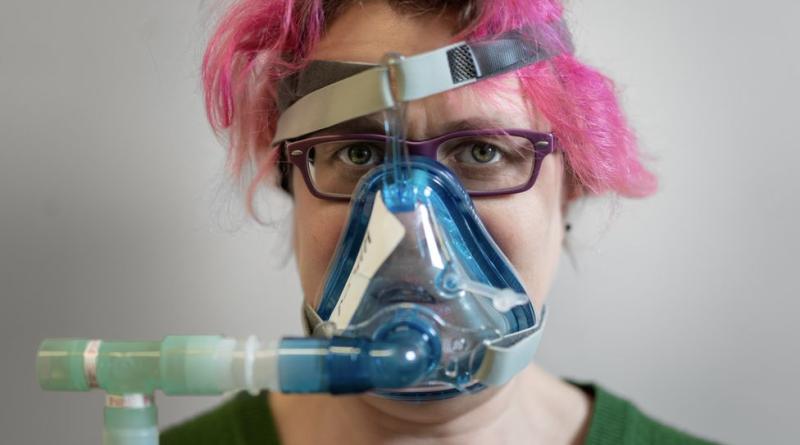Volunteers breathe polluted air to test impact on brain

In a lab in Manchester, volunteers are donning masks to breathe in lungfuls of polluted air.
They're being exposed to different kinds of fumes, from diesel to cleaning products, in a bid to understand how pollution impacts the brain.
Scientists are analysing blood samples and the results of cognitive tests taken before and after exposure.
While it's well known that air quality affects the lungs and cardiovascular system, the brain is less studied.
Dr Ian Mudway, an environmental toxicologist from Imperial College London, is one of the scientists leading the study.
"Over the last 10 years, we have begun to see statistical associations between air pollution and a whole range of brain-related issues - all the way from how children learn, the way in which their cognition changes, to mental health and increased risks of dementia.
"What we're trying to do in this study is to actually do experiments to understand why there's an association, to find out what the underlying biological mechanisms are that link air pollution to adverse effects on the human brain."
The experiments are being carried out at the University of Manchester where researchers are creating four different types of pollution: diesel exhaust, wood smoke, cleaning products and cooking fumes (created by frying a pork chop in a fume cupboard).
The pollutant levels are carefully measured and controlled, then fed into an air chamber - essentially a room-sized plastic sac - and piped out to the volunteers to breathe in.
The participants come to the lab multiple times over several months, and for each visit they are exposed to a different pollutant or clean air for an hour. They never know what they're breathing in while the experiments take place.
Prof Gordon McFiggans, from the University of Manchester's Centre for Atmospheric Science, says a key aim is to rank the risk associated with each pollutant - both indoor and outdoor.
"There's a lot of emerging evidence that indoor air pollution can actually be more harmful than outdoor air pollution," he explained.
"And of course, when you open a window or you have mechanical ventilation, you can get outdoor pollutants inside and also indoor pollutants on the outside, so there's this whole wide range of exposures that everybody's receiving.
"And I think what we need to do is have some comprehensive guidance to individuals, so they're aware of the possibilities of different sorts of implications for their health."
The team says the brain tests are a direct way to look at cognitive function, while the biological samples can reveal what's happening to the body.
"What we want to do is understand the pathways by which the pollution actually affects the brain," Prof McFiggans says.
He says the team wants to establish if the pollutants are directly reaching the brain or whether it's an indirect effect. One possibility is that the pollutants cause inflammation in other parts of the body, like the lungs, and the chemicals produced by this biological process then make their way to the brain.
"At the moment we just don't know," he says.
The World Health Organization says 99% of the global population breathes in air that exceeds the UN's limits for common air pollutants and the combined effects of outside and indoor air pollution contribute to seven million premature deaths every year.
The team says understanding more about how pollution is impacting brain health is vital.
And although at first glance the study seems small - it involves 13 people - it's one of the largest analyses of its kind. This is because each volunteer is separately exposed to four pollutants (and clean air), and these results are compared with each other and then cross-compared with the results of every other participant to produce an analysis that will be statistically significant.
Bryony Evens is one of those taking part.
She says she's happy to breathe in pollution in the name of science - and passes the hours hooked up to the air chamber by reading a book.
She says: "If they can get more data on these sorts of things, it feels like it's a really worthwhile use of my time to help with the study like this.
"Anything that can be done to find out things that cause us damage, just in our normal way of life, that can be changed, seems like a really valuable thing to do."
The results are expected over the coming months.




